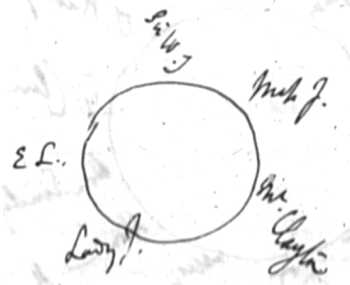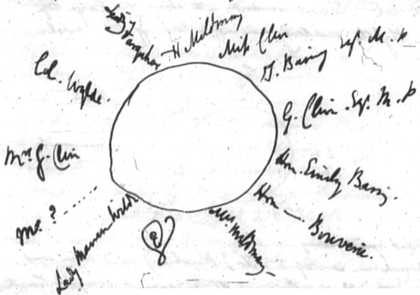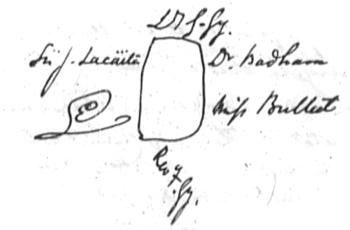This blog was devoted to the publication of Edward Lear's Diaries from 1 January 1858 to 12 May 1862. From January 2009 each was posted exactly 150 years after it was written and the project came to an end on 12 May 2012, the bicentenary of Lear's birth. The text is as exact as possible a transcript of Houghton Library MS Eng. 797.3. You can keep following the diaries at the new blog.
Monday, 29 April 1861
[XXX]1 ― a sad morning! Dry & cold.
Mr. Wood
Miss Wood most pleasant & nice
Lady Mary Wood
Lady Elizabeth Grey
[Sir] Francis Grey later these 3 ― also delightful2
Fred Sykes. ――― at 5: greatly altered, but a good kind fellow ―: it is not easy to resume anyone (after 14 years,) at once.
Walked out & left cards at Mrs. Farquhar, & Lady S. Vernon. Saw F.W. Gibbs.
At home ― dined at 7.30 ― μόνος.
[Transcribed by Marco Graziosi from Houghton Library, Harvard University, MS Eng. 797.3.]
Sunday, 28 April 1861
Gray. ― dry early.
Wrote to John E. Cross.
C. Fortescue breakfasted with me ―: pleasant ― much talk of A.P. Stanley’s article on Essays & Reviews. He left at 1.20. I went out (μόνος) & called on the Godleys: J.G. is I think ill beyond hope, & she looks sadly. ― Then on Wynnes, where I lunched with Mr. W. & the 2 Miss W.s (they tell me the Q. never knew the disorder of the Dss. of K.1 & the Dss. did not recognize her at her last visit: & consequently the Q. has never spoken to P.A. since, he having kept the matter from her. And that she is having a statue made of the Dss., (by Theed!) dressed & coloured like life.)
3dly on Crakes: Mr. C. is still more feeble ― & goes to St. Leonards on [].2
Walked as far as the Church, with M.A.C. & called on (4th) Simeon ― where I saw his daughters. ― 5th Col. Sykes ― out. home: & [found]3 Frith & 2 daughters at the door. Also Fairbairn had called.
Out again and called on ˇ[6] Fairbairn, 7 ― Bouverie, 8 Lushington, 9. Adderley ― all out. 10. Sir W. James ― Walter better ― home again by 6.30. 7.40 Dowager Countess Greys.
Lady G. told me (before people came,) that it is true the Q. never knew of the Dss.’s complaint, cancer ― nor does she now ― but says the Newspaper stories are false ― & it is not thought worth while to undeceive her. And the Dss. herself never knew ― being never told ― & tho’ she had 5 aperte ferite4 ― grew weaker, [thinking] herself very ill, but thankful that she had no positive disease like Cancer.
It was [―] a query with me, why the 2 Royal folk would not acknowledge to cancer? ― simply vulgar terror of an ugly disease, or lofty avoidance of an unroyal unpleasantness. ― The 2 Woods were very nice & simple ― shewing lots of sketches ― (possibly preordained to do so by Lady G.G. ―) of Nice ― very clear & forcible: ― & each lauding the other’s work: ― both pleasant juveniles. ― Dr. B. I thought ill bred. Genl. C. Grey came in ― but I did not think him delightful. Countess Grey fast leaving our world. All the children of this Lady seem kind & respectful to her. ―
[Transcribed by Marco Graziosi from Houghton Library, Harvard University, MS Eng. 797.3.]
Saturday, 27 April 1861
Quite dark till 12 ― fog ― & rain.
Then snow! (It snowed to 2 or 3 P.M.)
Of course no work could be done. Foords men came, & fixed in the Damascus & Beirût.
Sent the old sketch or design of Bethell’s Parnassus to Sybella Clive as her wedding present.
Lunched at 3 ― & read Arthur Stanley’s excellent & beautiful Review of “Essays & Reviews.”1
Worked at the Cedars till 5. ― Called on Clowes, out, & Foords. Damp ― cold ― dark dirty.
Health, I rejoice to say, better.
But the sore strange pain of Ann’s loss seems never to heal.
Dined at Sir W. James ― kind good people. Their little boy had met with a curious accident, ― the string of a large top wound up tightly suddenly ran out, & tore off his nail.

Pleasant quiet evening.
Sir W.J. (who was at Oxford with J. Ruskin ―) said there was always something odd about him ― & that his parents brought him there & that Mr. R. Senior ― said, (requesting a private interview with the dean of C. Church,) “would it be against the rules of the University for my son to have a Chessboard in his room?[”]
[Transcribed by Marco Graziosi from Houghton Library, Harvard University, MS Eng. 797.3.]
- In the Edinburgh Review. Vol. 113, no. 230, April 1861. 236-256. [↩]
Friday, 26 April 1861
Dry ― gray ― cold: dim ―
Ἃς μοῦ βοηθήσῃ ὁ Θεός!1
ˇ[came] Mansfield Parkyns, who staid till 3 ― from 11. Gibbs ― F.W. C.S. Fortescue.
Charles Dixon ― who used to be at Sass’s2 ― in 1834,5, & who has been in India ever since. !!
Later ― Lady Goldsmid, Mrs. & Miss Proctor.
Worked by fits at the Cedars.
At 5 ― went out; to Goulds ― who was singularly vulgar & odious ― & as he is always so more or less, that means something frightful. ― D. Wyatts ― out. Foord’s ― & back.
At 7.45 to Mrs. Mildmay’s, a house of wealth.

It is useless to write down all or part of what one feels: ― so I do not note how dear Ann’s death comes to me so vividly & drearily often & often.
[Transcribed by Marco Graziosi from Houghton Library, Harvard University, MS Eng. 797.3.]
Thursday, 25 April 1861
Dry ― gray ―
Worked at Cedars ― but very brokenly.
Mrs. Mildmay, & 2 daughters came.
Octavius Smith, Mrs. Smith, & Col. Nicholson.
Later, C.M. Church ― good kind fellow.
At 5 I went out, & called on Col. Sykes, Crakes, Bethells, & Col. Hornby.
Dined with F.L. ― who came home with me afterwards, & staid till nearly 12. ―
Notes from Mrs. Clive, & H.S.J. Mildmay, about purchasing the Damascus.
XX
[Transcribed by Marco Graziosi from Houghton Library, Harvard University, MS Eng. 797.3.]
Wednesday, 24 April 1861
Fine ― dry again.
At 11 came Mr. & Mrs. Evans ― Miss Gisborne, & one “Contine.”
Later ― H. Mildmay, & Sybella Clive.
Ἔπειτα,1 William Nevill.
At 4 I walked to Lady James’s, & to Millais’s, leaving cards, & to Col. Hornby’s: ― Lady Denison has returned.
Dress, ― & to Sir F. Goldsmid’s ――
Lady G. ― Miss ? a sculptress ―― Mrs. Montagu, & Mrs. Proctor, whom I like ― indeed all the women. ― One man only ― a Mr. Drake, or Drax: vulgar piuttosto, but lively. ― R.F. Burton is married ― says Mrs. Proctor. Lady G. is extremely charming & pleasant: ― later, talking of Miss ? (the sculptress ―) I most stupidly said “something about her eyes prevents her being handsome.” ― Now, Lady G.’s eyes are not good, ― & I was disgusted with my folly. After dinner I could not help singing ― as lady G. asked me ―: “Drax” evidently hated music. ―
At last, singing Love & Death ― he burst out at the end ― “the Ass between the 2 bundles of Hay!” for which I delighted in him.
But it seems I have fallen into cœrulæan lands. ― Andiam.2
Returning home at 11: ― George Middleton overtook me. ―
MARY DIED AT SEA ― THIS DAY.
JUNE. 29. 1861.
[Transcribed by Marco Graziosi from Houghton Library, Harvard University, MS Eng. 797.3.]
Tuesday, 23 April 1861
Very dark at intervals ― & at last, rain.
Letters from Jessy Foy ― E. Tennyson, ― & Mr. Edwards.
Worked at the Cedars.
M. Parkyns came & sate 2 hours: a really nice good fellow.
At 6 ― S.W.C. ― but I walked out with him, to Pall Mall & back.
At 7.30 ― came Daddy Hunt ― & our dinner & evening were, as always, ― delightful. He is a very solid good fellow, & wonderful in contrast to J.E. Millais ― all outside & froth. We talked much: ― of many things. ―
At 11.15 he went.
William Raleigh called at noon, to wish me good bye ―: he starts for Melbourne to day.
[Transcribed by Marco Graziosi from Houghton Library, Harvard University, MS Eng. 797.3.]
- A symbol I don’t understand, which may refer to the “Jessy Foy” written above it. [↩]
Monday, 22 April 1861
Health better ― thank God.
Dry ― but darker.
Nice letter from John B. Harford.
Worked a very little at the camels in Beirût ― & then shut up ― unable to apply to any other work ― sleeping or reading all the rest of the day till now ― 4 ― except when J.E. Millais came in for 20 minutes.
I wish I could close the Damascus & Beirût, & get them away: this wholesale idleness ― absolute do-nothing-ness is really frightful.
Nevertheless ― I slept till 5 ― καὶ ἦλθε κανεῖς.1 Went out at 5.30 ― & called at H.J. Bruce’s ― out. But they said W.F.B. was very ill. ―― Called on S.W.C. ―out. Then to Millais ― 24 Down St. Mrs. M. was there, but in the dark, & a shade over her eyes ― being ill of neuralgia.
The dinner was very good: ― but the 2 hours I passed there, a bore. Mrs. R.’s2 ― I mean Mrs. M.’s ― cold Scotch accent, her vulgar queries & half suppressed jealousy about Hunt ― (who is as the Sun to a Candle compared to J.E. Millais) ― her catching at any Aristocratic name, ― her pity of Bachelors ― “its just so melancholy!” ― (as if one half of her ˇ[2] matrimonial ventures in life had turned out so happily!) ― & her drawling stoniness disgusted me ― wrongly or rightly I don’t yet quite know ―― so that I don’t care to see her again. J.E.M. has far better qualities than she ― such is my impression. He walked, at 9 with me to Bo[] St.: but I must say I do not care even to see him much more. As I consider Daddy H. far his superior, this cannot be envy ― nor is the feeling, I believe, anything but one arising from the utter difference of M.’s nature & my own: he, at 30 is like a crafty aged ˇ[French] dancing=master, ― & has neither depth nor softness in his character,
Ἂς ἀφείσωμεν τὴν Ἀγγλίαν. Καὶ ἡ ἀδελφή δὲν ζῆ τώρα.3
[Transcribed by Marco Graziosi from Houghton Library, Harvard University, MS Eng. 797.3.]
Sunday, 21 April 1861
Dry: ― but very cold ― & gray: ― darky even, at times.
Better in health: & went to C.F.’s at 10¼. ― At breakfast were H. Grenfell, & T.G. Baring: & (unexpectedly ―) A. Seymour. A very pleasant morning.
At 1 T.G.B. & I went in a cab to the Zoo. Gardens: ― & saw all things: ― not to speak of J. Millais, H.V. Johnson ― & M. Halliday. ―― We, B. & I walked back to Stratford Pl. (barring a cab from Devonshire Place.) Baring is undoubtedly one of the most persevering, good, amiable, pure-minded men I wot of. ―
Cab at 7¼ to Lady Greys

And in the evening Lady Grey ― but very much aged & feebler. ―― a pleasant evening. ― walked back with Lacaita.
[Transcribed by Marco Graziosi from Houghton Library, Harvard University, MS Eng. 797.3.]
Saturday, 20 April 1861
Fine ― dry.
Slept ill, rose at 9.
Did “nothing” all day, but set my palette. Dreary blank hours. Played ― wrote ― slept ― fretted: ― stomach ache & belly ache.
Dined on 1 chop at 2. ― No one came, at least, it is now 3.30. In wandering about these 2 rooms, I mind me of so many days similarly passed in 1850 ― 2 doors off: ― not to speak of the Nile, Corfû &c. Certes, my faculty for doing absolute=nothing when at all in suspense, is remarkable.
And now I do not think I shall go either to C.F.’s ― or to Lady G. Greys ― or to Millais; so unhinged & weary is this child.
At 5.30 came Edwd. (Major) Williams ― much aged & seccato.1 ― Then S.W. Clowes, who persuaded me to dine with him at the Blue Posts.
So I sent off 2 drawings & 2 birds (Parrots,) to Fairbairn, & 1 ditto & 2 ditto to T.G. Baring: then cab to B. Posts.
Dinner with S.W.C. pleasant, & went to tea with him afterwards.
Found letter from T. Fairbairn.
What a weary weary day!!
[Transcribed by Marco Graziosi from Houghton Library, Harvard University, MS Eng. 797.3.]
- “Annoyed,” but the word in Italian also means “dried.” [↩]
